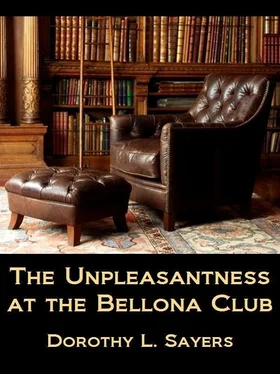“Messing about with bottles?”
“Well, chemists’ stuff and things. Ladies have to have their hobbies you know, not having any work to do. It makes a lot to clear up.”
“I’m sure it does. Well, go on, Nellie — I didn’t mean to interrupt.”
“Well, I gave Nurse Armstrong’s message, and Miss Dorland said, ‘Oh dear, Nellie,’ she said, ‘poor old gentleman. It’s been too much for him. Give me the brandy, I’ll take it along. And run along and get Dr. Penberthy on the telephone.’ So I gave her the brandy and she took it upstairs.”
“Half a moment. Did you see her take it upstairs?”
“Well, no, I don’t think I actually saw her go up — but I thought she did. But I was going down to the telephone, so I didn’t exactly notice.”
“No — why should you?”
“I had to look Dr. Penberthy’s number up in the book, of course. There was two numbers, and when I got his private house, they told me he was in Harley Street. While I was trying to get the second number Miss Dorland called over the stairs to me. She said ‘Have you got the doctor, Nellie?’ And I said, ‘No, miss, the doctor’s round in Harley Street.’ And she said, ‘Oh! well, when you get him, say General Fentiman’s had a bad turn and he’s coming round to see him at once.’ So I said, ‘Isn’t the doctor to come here, miss?’ And she said, ‘No; the General’s better now and he says he would rather go round there. Tell William to get a taxi.’ So she went back, and just then I got through to the surgery and said to Dr. Penberthy’s man to expect General Fentiman at once. And then he came downstairs with Miss Dorland and Nurse Armstrong holding on to him, and he looked mortal bad, poor old gentleman. William — the footman, you know, came in then and said he’d got the taxi, and he put General Fentiman into it, and then Miss Dorland and Nurse went upstairs again, and that was the end of it.”
“I see. How long have you been here, Nellie?”
“Three years — sir.” The “sir” was a concession to Parker’s nice manners and educated way of speech. “Quite the gentleman,” as Nellie remarked afterwards to Mrs. Mitcham, who replied “No, Nellie — gentlemanlike I will not deny, but a policeman is a person, and I will trouble you to remember it.”
“Three years? That’s a long time as things go nowadays. Is it a comfortable place?”
“Not bad. There’s Mrs. Mitcham, of course, but I know how to keep the right side of her. And the old lady — well, she was a real lady in every way.”
“And Miss Dorland?”
“Oh, she gives no trouble, except clearing up after her. But she always speaks nicely and says please and thank you. I haven’t any complaints.”
“Modified rapture,” thought Parker. Apparently Ann Dorland had not the knack of inspiring passionate devotion. “Not a very lively house, is it, for a young girl like yourself?”
“Dull as ditchwater,” agreed Nellie, frankly. “Miss Dorland would have what they called studio parties sometimes, but not at all smart and nearly all young ladies — artists and suchlike.”
“And naturally it’s been quieter still since Lady Dormer died. Was Miss Dorland very much distressed at her death?”
Nellie hesitated. “She was very sorry, of course; her ladyship was the only one she had in the world. And then she was worried with all this lawyer’s business — something about the will, I expect you know, sir?”
“Yes, I know about that. Worried, was she?”
“Yes, and that angry — you wouldn’t believe. There was one day Mr. Pritchard came, I remember particular, because I happened to be dusting the hall at the time, you see, and she was speaking that quick and loud I couldn’t help hearing. ‘I’ll fight it for all I’m worth,’ that was what she said and ‘a… something — to defraud’—what would that be now?”
“Plot?” suggested Parker.
“No — a—a conspiracy, that’s it. A conspiracy to defraud. And then I didn’t hear any more till Mr. Pritchard came out. and he said to her, ‘Very well, Miss Dorland, we will make an independent inquiry.’ And Miss Dorland looked so eager and angry, I was surprised. But it all seemed to wear off, like. She hasn’t been the same person the last week or so.”
“How do you mean?”
“Well, don’t you notice it yourself, sir? She seems so quiet and almost frightened-like. As if she’d had a shock. And she cries a dreadful lot. She didn’t do that at first.”
“How long has she been so upset?”
“Well, I think it was when all this dreadful business came out about the poor old gentleman being murdered. It is awful, sir, isn’t it? Do you think you’ll catch the one as did it?”
“Oh, I expect so,” said Parker, cheerfully. “That came as a shock to Miss Dorland, did it?”
“Well, I should say so. There was a little bit in the paper, you know, sir, about Sir James Lubbock having found out about the poisoning, and when I called Miss Dorland in the morning I took leave to point it out. I said, ‘That’s a funny thing, miss, isn’t it; about General Fentiman being poisoned,’ just like that, I said. And she said, ‘Poisoned, Nellie? you must be mistaken’. So I showed her the bit in the paper and she looked just dreadful.”
“Well, well,” said Parker, “it’s a very horrid thing to hear about a person one knows. Anybody would be upset.”
“Yes, sir; me and Mrs. Mitcham was quite overcome. ‘Poor old gentleman,’ I said, whatever should anybody want to do him in for? He must have gone off his head and made away with himself,’ I said. Do you think that was it, sir?”
“It’s quite possible, of course,” said Parker, genially.
“Cut up about his sister — dying like that, don’t you think? That’s what I said to Mrs. Mitcham. But she said a gentleman like General Fentiman wouldn’t make away with himself and leave his affairs in confusion like he did. So I said, ‘Was his affairs in confusion then?’ and she said, ‘They’re not your affairs, Nellie, so you needn’t be discussing them.’ What do you think yourself, sir?”
“I don’t think anything yet,” aid Parker, “but you have been very helpful. Now, would you kindly run and ask Miss Dorland if she could spare me a few minutes?”
Ann Dorland received him in the back drawing-room. He thought what an unattractive girl she was, with her sullen manner and gracelessness of form and movement. She sat huddled on one end of the sofa, in a black dress which made the worst of her sallow, blotched complexion. She had certainly been crying, Parker thought, and when she spoke to him, it was curtly, in a voice roughened and hoarse and curiously lifeless.
“I am sorry to trouble you again,” said Parker, politely.
“You can’t help yourself, I suppose.” She avoided his eye, and lit a fresh cigarette from the stump of the last.
“I just want to have any details you can give me about General Fentiman’s visit to his sister. Mrs. Mitcham brought him up to her bedroom, I understand.”
She gave a sulky nod.
“You were there?”
She made no answer.
“Were you with Lady Dormer?” he insisted, rather more sharply.
“Yes.”
“And the nurse was there too?”
“Yes.”
She would not help him at all.
“What happened?”
“Nothing happened. I took him up to the bed and said, ‘Auntie, here’s General Fentiman.’”
“Lady Dormer was conscious, then?”
“Yes.”
“Very weak, of course?”
“Yes.”
“Did she say anything?”
“She said ‘Arthur!’ that’s all. And he said, ‘Felicity!’ And I said, ‘You’d like to be alone,’ and went out.”
“Leaving the nurse there?”
“I couldn’t dictate to the nurse. She’d to look after her patient.”
Читать дальше












